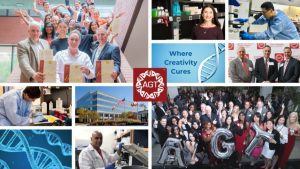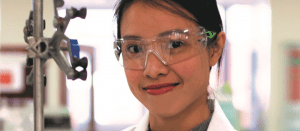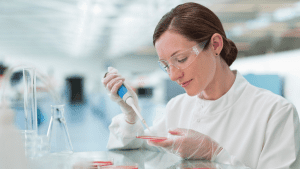
Ask Me Anything: Careers in Commercial Sales – Rare Disease
In our new Ask Me Anything series, aka live virtual office hours with industry experts, Chris Frew, CEO of BioBuzz Networks, sat down with Yaffa Grace, Co-Founder and Vice President of Recruiting, BlueGene Search, and Jessica Riggenberg, Founder, ELIXR Coaching & Consulting, to dive into the intricacies of a career in commercial sales in rare diseases.
March 15, 2024
| BioBuzz has been connecting the life science workforce since 2009. We’ve built an expansive community in the Mid-Atlantic with a national readership that spans from Massachusettes to Florida, and New York to California. For our next chapter, we’re building a proprietary talent logistics model to help employers source and hire life science talent. Learn more. |
In the realm of pharmaceuticals, rare diseases present a unique challenge and opportunity for commercial sales strategies. With a smaller patient population and often complex treatment regimens, selling medications for rare diseases requires a nuanced approach.
The following serves as a quick summary, with some bite-size Q&A’s from the event itself.
Understanding the Market Dynamics
Rare diseases, also known as orphan diseases, affect a small percentage of the population. Despite this, the combined impact is significant, with over 300 million people worldwide affected by rare diseases according to the World Health Organization. However, the rarity of these conditions poses challenges for pharmaceutical companies in terms of commercial viability.
One of the primary challenges in commercial sales of rare disease medications is the limited patient pool. Unlike more common diseases where the market size is substantial, targeting a niche population requires tailored approaches. You can’t apply the same commercial model to a rare disease that you do to a large-market disease. You have to think very differently.
Furthermore, the diagnosis and treatment of rare diseases often involve specialized expertise and infrastructure, adding layers of complexity to the commercialization process. This necessitates collaboration between pharmaceutical companies, healthcare providers, and patient advocacy groups to ensure effective distribution and patient access.
Navigating Regulatory Hurdles
Another significant aspect of commercial sales in rare diseases is navigating the regulatory landscape. Regulatory agencies such as the FDA in the United States and the EMA in Europe have specific pathways and incentives to encourage the development of treatments for rare diseases, known as orphan drug designation.
While orphan drug designation provides certain advantages such as market exclusivity and financial incentives, obtaining regulatory approval for rare disease medications can still be challenging. Pharmaceutical companies must invest in robust clinical development programs and engage with regulatory authorities early in the drug development process to navigate these challenges effectively.
Additionally, post-marketing commitments, including real-world evidence generation, play a crucial role in demonstrating the long-term efficacy and safety of rare disease treatments.
Building Strong Relationships
In the realm of rare diseases, building strong relationships with key stakeholders is paramount to commercial success. Both Yaffa and Jess strongly emphasized this. This includes not only healthcare providers and regulatory agencies but also patient advocacy groups and caregivers. These groups often play a crucial role in raising awareness, facilitating diagnosis, and advocating for improved access to treatments.
Pharmaceutical companies that actively engage with patient advocacy groups can gain valuable insights into patient needs and preferences, inform clinical trial design, and enhance patient access programs. Moreover, by fostering trust and transparency, companies can cultivate a positive reputation within the rare disease community, which is vital for long-term success.
Innovation and Collaboration
Innovation lies at the heart of commercial sales in rare diseases. Given the complex nature of these conditions, there is a constant need for novel therapeutic approaches that address unmet medical needs. This requires collaboration across various stakeholders, including academia, biotechnology firms, and contract research organizations.
Technological advancements such as gene therapy and precision medicine hold promise for the treatment of rare diseases. These innovative approaches offer targeted solutions tailored to the underlying genetic mechanisms of the disease, potentially transforming the treatment landscape.
Conclusion
Commercial sales in rare diseases present unique challenges, from navigating regulatory hurdles to addressing the needs of a niche patient population. However, with strategic approaches centered around understanding market dynamics, building strong relationships, and fostering innovation and collaboration, pharmaceutical companies can overcome these challenges and deliver life-changing therapies to patients in need. As the landscape of rare disease research and development continues to evolve, embracing these principles will be essential for driving progress and improving patient outcomes.
What is Ask Me Anything?
BioBuzz’s new Ask Me Anything series offers participants the opportunity to gain firsthand insights and guidance from industry experts. Each week, a different expert joins the session to share their expertise and address burning questions submitted by attendees.
The goal is to directly connect talent with subject matter experts, provide actionable insights, and facilitate interactive discussions to help individuals level up in specific areas of expertise. The sessions follow a structured format, including expert presentations, pre-submitted question review, and an open-floor Q&A session. Attendees, including members of BioBuzz’s talent community, are encouraged to register in advance and submit questions for consideration. Through this engaging format, participants can expand their knowledge, network with peers, and gain valuable insights to advance their careers in the life sciences industry.
Here are some Q&A highlights from our very first series with Yaffa Grace and Jessica Riggenberg.
Commercial Sales in Rare Disease. Where do we begin?
Yaffa Grace: Rare disease is a deeply personal topic for me, given my mother’s condition. This personal connection underscores the importance of ensuring that the right people are involved in bringing treatments to patients. The journey of delivering treatment in rare disease differs significantly from that in general pharma. In this field, it’s essential to not only refine your skills but also highlight a transferable skill set.
Jessica, could you elaborate on the differences you’ve observed compared to specialty sales as you transitioned into rare disease?
Jessica Ringgenberg: Absolutely. Recruiting teams in biotech are seeking competencies that enable success in rare disease settings, where patient volume may be low, and the sales cycle lengthy. Understanding and prioritizing patient needs is paramount. Rather than focusing solely on closing deals, applicants should adopt a problem-solving approach tailored to each office’s unique challenges and patient requirements. It’s crucial to convey a genuine commitment to patient well-being during interviews and engagements. Can I add to this by emphasizing the importance of disease state awareness in rare disease? Often, field teams spend months educating themselves on disease states before engaging with providers. This emphasis on education and awareness sets rare disease sales apart from traditional pharmaceutical sales, where the focus may be more on meeting sales targets. Would you agree, Yaffa?
Yaffa Grace: Absolutely. Rare disease sales involve becoming a trusted consultant to providers, guiding them not only on identifying patients but also on initiating therapy effectively. This consultancy role requires a shift from an individual sales approach to collaborative, cross-functional engagement. It’s about problem-solving, providing value, and fostering collaboration across different teams within the organization. Would you like to expand on this, Jessica?
Jessica Ringgenberg: Indeed. Collaboration is key, particularly in rare disease settings where cross-functional teamwork is emphasized in job descriptions. Applicants should highlight their experience in collaborating with various teams, such as Medical Science Liaisons, Key Opinion Leaders, and market access teams. Demonstrating transferable skills, such as patient advocacy and innovative problem-solving, from previous roles can greatly enhance one’s suitability for rare disease sales positions.
Is there a strategy for effectively showcasing extensive experience in vaccine distribution and education on a resume, particularly in relation to the processes involved in rare disease management? How can one accurately reflect skills and accomplishments, which align with the desired roles, on paper despite potential challenges in conveying their relevance?
Yaffa Grace: It’s crucial to highlight transferable skill sets by aligning your resume with keywords commonly found in rare disease job descriptions. Take time to identify these keywords and ensure they are reflected in your resume and LinkedIn profile. This optimization enhances your visibility to applicant tracking systems and search engines.
Jessica Ringgenberg: Don’t hesitate to self-promote. Draw connections between your past experiences and the desired roles, emphasizing keywords like “reimbursement,” “patient advocacy,” and “rare pathogens.” Make these connections explicit during interviews to demonstrate your suitability for rare disease positions.
Chris Frew: Expand your branding beyond your resume and LinkedIn profile. Utilize descriptive language and headlines to present your expertise and interests, such as “Rare Disease Advocate.” This holistic approach enhances your online presence and differentiates you from other candidates.
Jessica Ringgenberg: Focus on the impact and outcomes of your work rather than just listing activities. Highlight achievements like patient enrollments or launch metrics to demonstrate your contributions effectively.
Yaffa Grace: Both sales data and contributions are important, but emphasize the impact and outcomes of your work. Metrics related to launch success or patient outcomes carry more weight than mere activity metrics.
Jessica Ringgenberg: Craft your resume and LinkedIn profile as compelling stories that reflect your accomplishments and suitability for the desired roles. Utilize storytelling techniques to summarize your history and highlight your passion and expertise in rare disease management.
Jessica Ringgenberg: Networking is key. Take proactive steps to connect with professionals in the rare disease biotech industry, both online and in person. Passion and determination are essential in pursuing opportunities in this field.
What advice would you offer individuals seeking to transition into rare disease roles, particularly if they find themselves potentially overqualified for the positions they’re applying to, yet possess a strong personal connection and passion for rare diseases?
Jessica Ringgenberg: When transitioning into rare disease roles, it’s crucial to leverage your personal connection and passion. Share your personal story during interviews to demonstrate your commitment to the cause. Additionally, emphasize your coaching mindset and your ability to support and empower your team to make a difference for patients. Even if you’re deemed overqualified, focus on the unique value you bring to the role, such as your ability to provide insights and support that go beyond traditional qualifications. Ultimately, storytelling and confidence in your abilities will be key in overcoming any concerns about overqualification.
Unable to attend but have questions on the topic?! Get in touch with our experts via LinkedIn. Yaffa Grace and Jessica Ringgenberg are ready and waiting.
- About the Author
- Latest Posts
BioBuzz is a community led, experience focused, biotech and life sciences media and events company. BioBuzz highlights regional breaking news, industry professionals, jobs, events, and resources for business and career growth. Their weekly newsletter is subscribed to by thousands in the BioHealth Capital Region and Greater Philadelphia as the go-to for industry updates.










